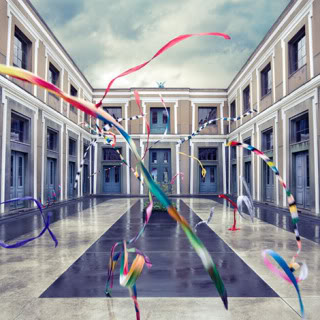It’s a truth universally recognised that, sadly, we can’t all be Kate Bush or the Strokes; for every performer that gets everything right at pretty much the moment of conception, there are dozens more that need a bit of a run-up before taking up residency in their particular plateaus, from Pulp to Muse, or from the Cocteaus to Kraftwerk. Truth be told, we never thought we’d be discussing Efterklang in such rarefied company – after all, they always felt like the sort of lower-mid-table proposition that could look forward to a lifetime of Peel patronage (or its latter-day equivalents, Kennedy kudos and Dandelion bouquets) without ever really having much else to show for it. But then they started doing those look!-we’re-actually-an-orchestra! performances last year (as captured on the heartily recommended ‘Performing Parades’, were you not fortunate enough to catch them in the flesh), and, suddenly, we were looking at an outfit adept at sky-stroking and unafraid of tumbling into the sublime.
All of which augured auspiciously for What They’ve Done Next, and, indeed, the first of those things, ‘Modern Drift’, is a minor masterpiece that suggests their recently absorbed lessons have borne copious fruit. Its considered phraseology alone calls to mind young Paddy McAloon, while the dual piano runs combine the almost-crying cascades of Elbow’s ‘Scattered Black And Whites’ with a more organic reimagining of the psytrance waters into which floundering latter-day shoegazers dipped curious toes, and patient, plangent guitars give way to warm horizontal fiddling. ‘Full Moon’, too, gladdens the heart considerably, taking many of its cues from Talk Talk at their most transformative, with vocals in search of liberation and release, audacious instrumentation that feels on the point of pyrotechnics throughout – helped not inconsiderably by the sort of neo-Gregorian, horrific-hint-filled vocal backing that the aforementioned La Bush used to such sternly stirring effect in her mid-period – and a questioning, monochromatic bumpy metronomy. Why, another eight of these, and it’d be standing ovations all round.
Which makes it all the sadder to report that the rest of the album struggles and strives to maintain these fine watermarks, only to admit defeat on a regular basis. It’s not that Efterklang don’t sound wholly wedded to the power of possiblity that they’ve discovered of late, far from it, but their obvious sense of satisfaction doesn’t engage anything like as often as it should, leading to all manner of tracks that feel like they were probably tremendous on paper and a joy to execute (all boding terrifically for future gigs, of course) but something less of an event in translation. ‘Raincoats’, for example, is minimalist flamenco with chattering peahen interjections, stumbling-on-the-stairs bass and guitar that’s clearly being played by somebody running away from Battles. ‘Scandinavian Love’ sees horns and xylophone tangoing away with precision choreography as assorted associates appear to wander through the studio without having been warned exactly what the time signature going on therein actually was. ‘Mirror Mirror’, which, so late in proceedings, we’d begun to really hope was going to be a Dollar cover, is instead a hoedown on Horlicks in a half-remembered waterfall.
So really, then, there are three key problems with this album. Firstly, ideas like the ones just detailed ought to be the last word in life-enhancing; that they just, well, sit there, is a puzzling misfire to say the least. Secondly, this isn’t the Danes’ fault, but they’ve re-emerged at a point in time where, in term of albums being released, the embarrassment of riches is sufficient that decency alone is never going to be enough, especially when there are such knockout examples of what epic can mean as the North Atlantic Oscillation, Caribou and MGMT offerings tucked around the corner. And, finally, there’s the significant stumbling block of just how much ‘Alike’ and ‘the Soft Beating’ owe to, of all people, mid-noughties Coldplay, which is enough of an error of judgement that even the ‘Play themselves had a good go at distancing themselves from that particular era when they returned. It’s not that this is a bad album, but there was every reason to expect something remarkable; instead, Magic Chairs mostly spells the end of Efterklang’s all-too-brief brilliance.


